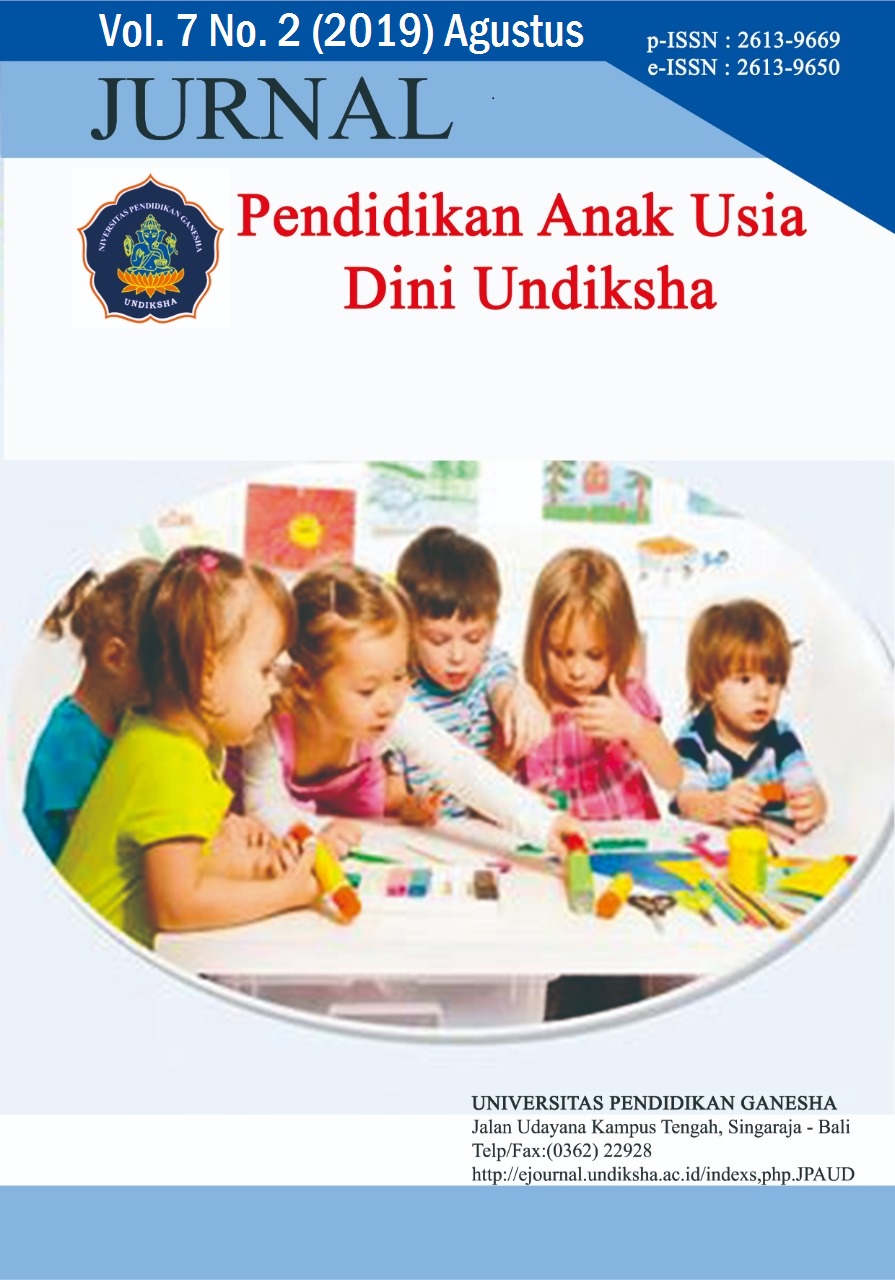PENGARUH METODE TOTAL PHYSICAL RESPONSE TERHADAP KEMAMPUAN KOSAKATA BAHASA INGGRIS ANAK KELOMPOK B
DOI:
https://doi.org/10.23887/paud.v7i2.18985Abstract
Abstrak Penelitian ini bertujuan untuk mengetahui perbedaan yang signifikan kemampuan kosakata bahasa Inggris, antara anak yang diberikan pembelajaran menggunakan metode total physical response (TPR) dengan anak yang diberikan pembelajaran menggunakan metode expositori pada anak kelompok B TK Gugus IV Kecamatan Buleleng. Tahun Pelajaran 2018/2019. Jenis penelitian ini adalah penelitian eksperimen semu dengan desain non equivalen control group design. Populasi dari penelitian ini adalah seluruh anak kelompok B TK Gugus IV Kecamatan Buleleng, yang berjumlah 220 orang. Teknik pengambilan sampel yaitu dengan teknik cluster sampling. Sampel dalam penelitian ini adalah anak kelompok B TK Santo Rafael yang berjumlah 18 anak sebagai kelompok eksperimen serta anak kelompok B1 TK Ganesa yang berjumlah 19 anak sebagai kelompok kontrol. Data hasil kosakata Bahasa Inggris anak dikumpulkan dengan teknik observasi menggunakan lembar observasi. Data yang diperoleh dianalisis menggunakan analisis statistik deskriptif dan analisis statistik inferensial dengan uji-t. Berdasarkan hasil analisis data diperoleh hasil uji-t yaitu thitung = 31,874 dan ttabel dengan taraf signifikan 5% pada derajat kebebasan (db) 35 adalah 2,030. Hasil uji-t menunjukkan bahwa thitung>ttabel, maka H0 ditolak dan HA diterima. Dengan demikian dapat diketahui bahwa, terdapat perbedaan yang signifikan kemampuan kosakata Bahasa Inggris antara anak yang diberikan pembelajaran dengan metode total physical response dengan anak yang diberikan metode expository.Kata Kunci : anak kelompok B, total physical response, kosakata.
Abstract The aim of this study is to know the significant difference of English vocabulary capability, between children who are given learning using total physical response method with children who are given learning using expository method in children group B of TK Group IV Buleleng District, Academic Year 2018 / 2019. This research type is quasi-experiment research with non-equivalent control group design. The population of this research is all the children of group TK Group IV Buleleng District. The total amount of population of this research is 220 people. The sampling technique is using cluster sampling technique. The sample in this research is the children of group B TK Santo Rafael which consists of 18 children as experiment group and children of group B1 TK Ganesa which consists of 19 children as control group. The data of children's English vocabulary is collected by observation technique using observation sheet. The data obtained is analyzed using descriptive statistical analysis and inferential statistical analysis with T-test. Based on the result of data analysis, the result of t-test is thitung 3,875 and ttabel with significant level 5% at degrees of freedom (db) 35 is 2,030. The result of t-test shows that thitung> ttabel, then H0 is rejected and HA is accepted. Thus, it can be seen that, there is a significant difference in the ability of English vocabulary between children who are given learning with total physical method with children who are given expository method.
keyword : children of B group, total physical response, vocabulary.
Downloads
Published
2019-07-26
How to Cite
., N. L. S., ., D. P. A. A. S. M., & ., P. R. U. S. M. P. (2019). PENGARUH METODE TOTAL PHYSICAL RESPONSE TERHADAP KEMAMPUAN KOSAKATA BAHASA INGGRIS ANAK KELOMPOK B . Jurnal Pendidikan Anak Usia Dini Undiksha, 7(2), 161–170. https://doi.org/10.23887/paud.v7i2.18985
Issue
Section
Articles
License
Authors who publish with the Jurnal Pendidikan Anak Usia Dini Undiksha agree to the following terms:
- Authors retain copyright and grant the journal the right of first publication with the work simultaneously licensed under a Creative Commons Attribution License (CC BY-SA 4.0) that allows others to share the work with an acknowledgment of the work's authorship and initial publication in this journal.
- Authors are able to enter into separate, additional contractual arrangements for the non-exclusive distribution of the journal's published version of the work (e.g., post it to an institutional repository or publish it in a book), with an acknowledgment of its initial publication in this journal.
- Authors are permitted and encouraged to post their work online (e.g., in institutional repositories or on their website) prior to and during the submission process, as it can lead to productive exchanges, as well as earlier and greater citation of published work. (See The Effect of Open Access)











